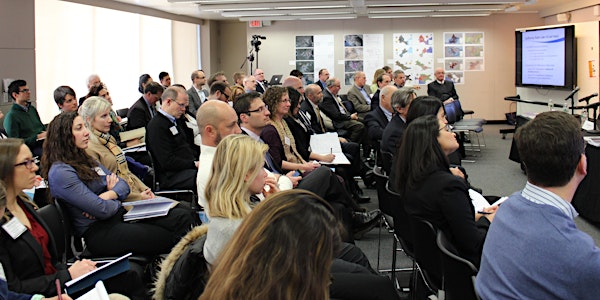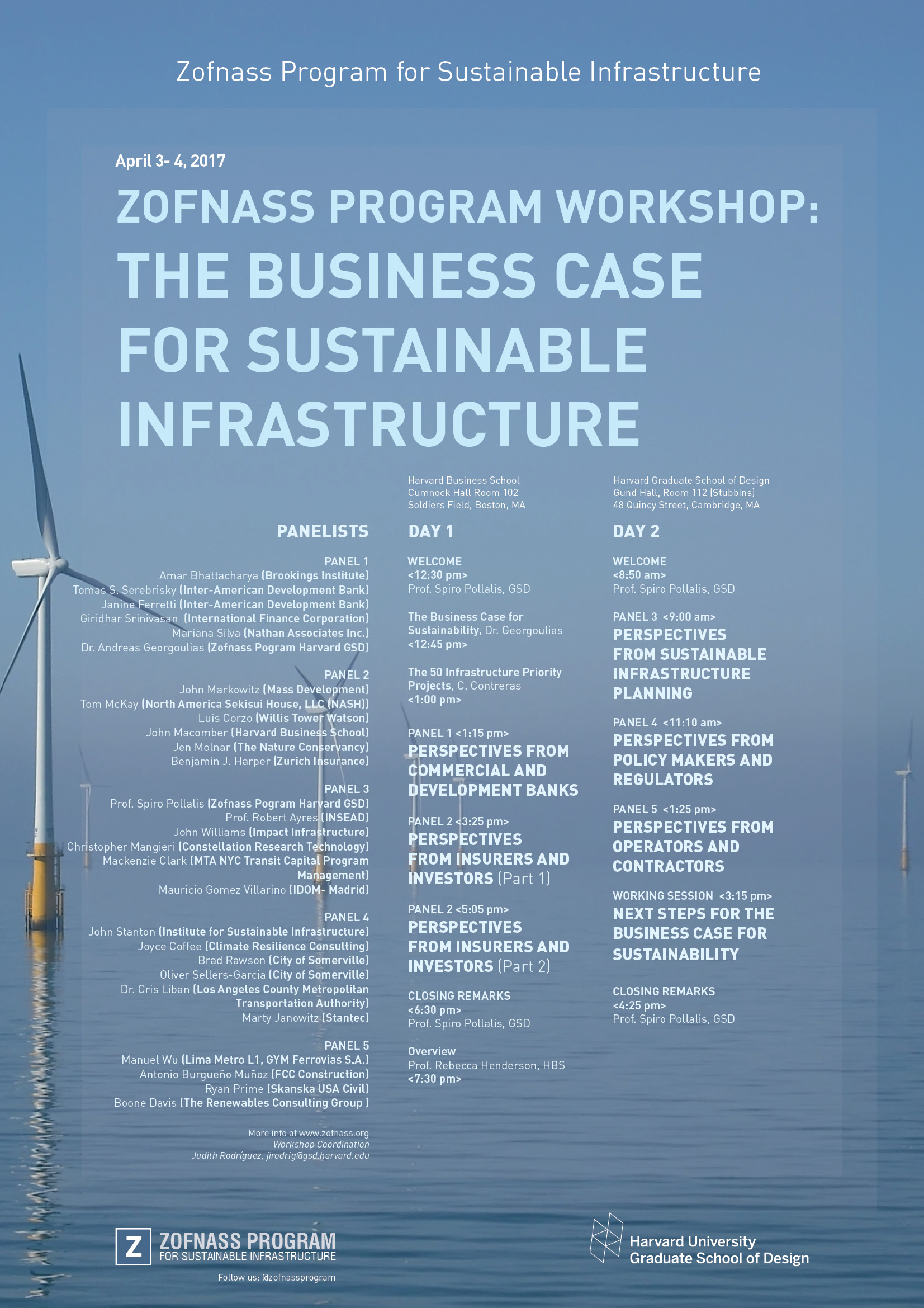
Zofnass Program Workshop: Business Case for Sustainable Infrastructure
Date and time
Location
Harvard Business School (Monday)
Cumnock Hall Room 102, Boston MA 02139 Harvard Graduate School of Design (Tuesday), 48 Quincy street, Stubbins Room 112 Cambridge, MA 02138Description

Zofnass Program Workshop: The Business Case for Sustainable Infrastructure
This Zofnass Workshop is dedicated to the discussion of the Business Case for Sustainable Infrastructure. The Zofnass Program for Sustainable Infrastructure considers critical to focus on the economic benefits of sustainable infrastructure. This workshop is geared as a platform to discuss the perspective of all relevant stakeholders involved in infrastructure about the Business Case for Sustainability and better understand opportunities for collaborative action when developing and operating new projects.
Decision-makers need to identify and understand the economic benefits of sustainability. The returns on sustainable investments represent an opportunity to contribute with applied research to this knowledge area, which is currently vague to stakeholders. It is widely known that sustainable projects avoid impacts, risks, costs and negative externalities, but these are rarely measured and shared with public officials and taxpayers. Understanding the types of costs, risks, and probability of risks allows stakeholders to deliver informed project designs that anticipate and withstand or adapt to these risks, minimizing their overall vulnerability. Through the Business Case for Sustainable Infrastructure, the Zofnass Program intends to articulate, in terms of productivity gains, how sustainable infrastructure contributes to social, business, and safety resilience. Illustrating the costs and vulnerabilities to hazards avoided through sustainable projects is the necessary first step for decision-makers to identify and understand the economic benefits of sustainability.
The Zofnass Program considers crucial to follow a multidisciplinary approach that considers the perspective of all stakeholders involved in infrastructure projects on the economic benefits of sustainable infrastructure. More often than not infrastructure projects are implemented through a heavily siloed approach, wherein there is no communication among different sectors. In addition, engineering is divided from finance and investment. Disparate training and research programs exist for each sector, which do not communicate with each other. Uncoordinated efforts in turn hamper collaboration and the implementation of best practices.
The main goal of this workshop is to provide a forum for all stakeholders to give perspectives on what is the value of sustainable infrastructure for them, what are the critical changes needed, and what would be the role of academia in the development of the Business Case for Sustainable Infrastructure. Each stakeholder group brings a unique perspective on how sustainability adds financial value and facilitates competitive returns. By combining each group’s unique decision-making processes and understanding of sustainability challenges, the workshop will shed light on how sustainable projects enhance competitiveness, resilience, and facilitate long-term economic growth.
Organized by
The mission of the Zofnass Program for Sustainable Infrastructure is to develop and promote methods, processes, and tools that quantify sustainability for infrastructure. Its goal is to facilitate the adoption of sustainable solutions for infrastructure projects and systems, and expand the body of knowledge for sustainable infrastructure.
The Zofnass Program was founded in 2008 by a generous donation by siblings Paul and Joan Zofnass, and is housed at Harvard University’s Graduate School of Design. The Zofnass Program extends its activities throughout Harvard including the School of Public Health, the Kennedy School of Government, the Business School and the Center for the Environment. The Zofnass Program is supported by the industry through an Industry Advisory Board and by research foundations.
The Zofnass Program prides itself on the collaborative nature of its research efforts. In addition to providing the generous on-going gift that founded and supports the program, Paul and Joan Zofnass have been advising the program’s research direction. The research team includes a core group of faculty from across Harvard and student research associates from undergraduate, graduate, and doctoral programs. The strong support provided by the industry through the Advisory Board makes the Zofnass Program unique and relevant: the collaboration of academic experts and industry specialists has led to the development of the Zofnass Rating System, that has been integrated into the Envision™ system of the Institute for Sustainable Infrastructure.
The program seeks to provide a series of resources and tools, and host events to facilitate sustainable project planning and design, as well as rate the sustainability of infrastructure projects. The Zofnass Program aims to serve as a clearing house for information collected from projects, both in its pilot phase and after the system is launched and utilized.
We will continue to improve the system and resources with our on-going research.